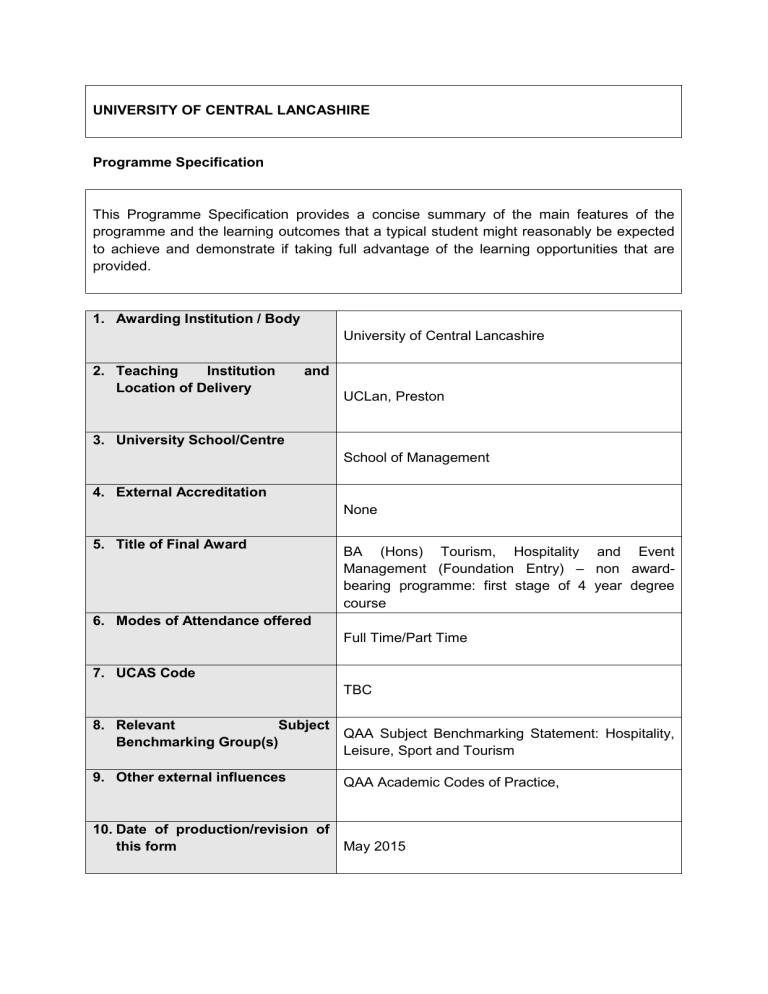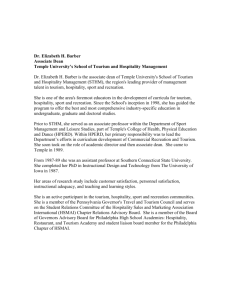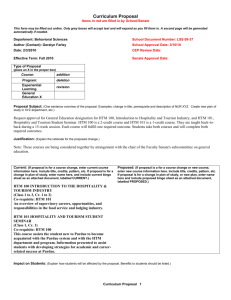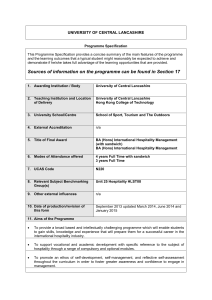course specification. - University of Central Lancashire

UNIVERSITY OF CENTRAL LANCASHIRE
Programme Specification
This Programme Specification provides a concise summary of the main features of the programme and the learning outcomes that a typical student might reasonably be expected to achieve and demonstrate if taking full advantage of the learning opportunities that are provided.
1. Awarding Institution / Body
2. Teaching Institution and
Location of Delivery
3. University School/Centre
4. External Accreditation
5. Title of Final Award
University of Central Lancashire
UCLan, Preston
School of Management
None
BA (Hons) Tourism, Hospitality
Management (Foundation Entry) and Event
– non awardbearing programme: first stage of 4 year degree course
6. Modes of Attendance offered
7. UCAS Code
8. Relevant
Benchmarking Group(s)
Subject
9. Other external influences
10. Date of production/revision of this form
Full Time/Part Time
TBC
QAA Subject Benchmarking Statement: Hospitality,
Leisure, Sport and Tourism
QAA Academic Codes of Practice,
May 2015
11. Aims of the Programme
To enable students to develop key academic skills so that they can gain confidence as learners in an HE context in order to work both independently and as part of a group.
To equip students with the key subject-specific knowledge, understanding and skills to enable them to successfully progress onto an appropriate undergraduate programme of study .
To enable students to build an awareness of personal development needs and potential career pathways and to develop their transferrable skills
12. Learning Outcomes, Teaching, Learning and Assessment Methods
A. Knowledge and Understanding
A1. The management principles required for study of tourism, hospitality and events at degree level.
A2. Select and collate information from a wide range of sources to analyse the business environment
A3. Basic skills in information technology allied to practical assessment when analysing the business environment
A4. Communication of information using written, oral and visual techniques.
Teaching and Learning Methods
Core knowledge acquisition occurs principally through tutor-led lectures (teaching) and directed study of textbooks and electronic resources. This is followed up by student led learning activity using text (books and e-resources), media (software, video, technical articles).
The understanding comes by way of application. This is aided by tutorials/workshops, fieldtrips. The use of independent study to consolidate understanding is encouraged through research based tasks built into assignments.
The Teaching and Learning strategies employed deliver opportunities for the achievement of the learning outcomes, demonstrate their attainment and recognise the range of student backgrounds. Delivery methods, activities and tasks are aligned with the learning outcomes for this programme, taking account of the learning styles and stage of the student.
Assessment methods
Assessment is through examination of key facts using a variety of methods. These may include formal examinations, or ‘phase tests’ during the year, focussing on a limited range of material. Written work will form the majority of the assessment process, including essays and reports and portfolios. Presentations and posters may also be used. Formative assessment is promoted within the programme to promote achievement. This is a structured application of knowledge derived from the tutor-led and individual student activities. The grades achieved are according to the Principles of Assessment, and results moderated by peer lecturers. Consideration of results at Module and Course Assessment Boards lead to recommendations for student Progression or Awards.
B. Subject-specific skills
B1. Apply management principles to the analysis of problems.
B2. Make effective use of information technology tools for presentation and analysis of findings.
B3. Demonstrate a logical approach to problem solving and basic research questions.
Teaching and Learning Methods
A combination of tutorials/workshops and practical work are used to bolster the subjectspecific skill development. For all coursework, timely feedback is used to reinforce the specific learning outcomes, nurture confidence and facilitate engagement with the learning process. This is allied to formative feedback for certain elements of work. Greater emphasis is placed on independent learning in the second semester of the course.
Assessment methods
As mentioned previously, a combination of written work, practical reports and examinations are used to assess individual achievement. This is supplemented, where appropriate, with
group based work, including posters and presentations.
C. Thinking Skills
C1. Select and interpret information from relevant sources
C2. Use information in order to be able to draw inferences, make decisions and reach conclusions
C3. Recognise and apply the appropriate concepts and techniques to the solution of problems.
C4. Clarify, explain and summarize ideas.
Teaching and Learning Methods
General intellectual skills are developed through the teaching and learning programme as outlined above. These include traditional lead lecture, allied workshops and seminars, practical and some field-based work.
Applied numeracy and literacy skills are developed by tutorial support, with an increasing emphasis on independent study as the year progresses. Research skills (C3) are developed by applying them to specific tasks and practical exercises. An appreciation of the wider context of tourism, hospitality and event management (C4) is developed through directed research, seminars and assignment work.
Formative and evaluative feedback is used as an essential part of the learning process.
Assessment methods
Formative feedback through the process of in-class interaction is valued in the development of the above intellectual skills. The skills outlined above are assessed through a combination of written, visual and oral assessments such as essays/reports, negotiated group assignments, presentations, examinations and practical portfolios.
D. Other skills relevant to employability and personal development
D1. Coherent, effective communication using written, visual and oral means.
D2. Work effectively both independently and in teams to achieve assigned objectives.
D3. Identify existing skills and recognize needs for further development
D4. Devise a personal development plan based on existing skills and knowledge of
progression and career pathways
Teaching and Learning Methods
The teaching and learning methods applied throughout the programme, as outlined above, are used to assist the progress of transferrable skills development. One-to-one tutorials with a Personal Tutor will also be invaluable in the development process.
Assessment methods
A range of assessments will be employed throughout the programme in order to assess communication skills in written (essays/reports, blogs, practical portfolio, examinations), visual (posters/presentations) and oral (presentations) forms. The majority of assessments will be individual, but group work in included in the professional case study module. Skills D3 and D4 will mainly be assessed through a portfolio and action plan.
13. Programme Structures*
Level Module
Code
Module Title
Level 3
(FE)
TLC114
TLC113
TLC109
TLC110
VOC106
VOC102
Contemporary Themes in
T.H.E (C)
Study Skills for Success (C)
T.H.E Themes in Action (C)
Management Fundamentals in
T.H.E (C)
Volunteering and Community
Action
Volunteering and Safety
Management
Credit rating
20
20
20
20
20
20
14. Awards and Credits*
Requires completion of 120 credits at Level 3.
Students who exit after successful completion of 120 credits at Level 3 will receive a transcript of the modules and grades
Successful completion of this programme provides specific progression onto Year 1 of one of the following degree courses within the School of Sport, Tourism and The Outdoors at the
University of Central Lancashire:
BA (Hons) International Tourism Management
BA (Hons) International Hospitality Management
BA (Hons) Event Management
Additionally, successful completion of this programme can, on a case-by-case basis dependent upon extra-curricular activity and prior relevant experience, lead to consideration for progression onto Year 1 of other appropriate degree courses within the School of Sport,
Tourism and The Outdoors.
15. Personal Development Planning
Opportunities to develop academic, subject specific and transferrable skill will be presented across the programme. The Study Skills for Lifelong Learning module will specifically allow for the development of information searching, sourcing and referencing, academic writing, evaluation, reflection, using feedback and action planning. The professional case study module will provide opportunities to undertake industry-based filed trips and have interaction with industry professional and will therefore help students develop an awareness of career pathways. Students will also have one-to-one development sessions with their personal tutor.
16. Admissions criteria
Programme Specifications include minimum entry requirements, including academic qualifications, together with appropriate experience and skills required for entry to study. These criteria may be expressed as a range rather than a specific grade. Amendments to entry requirements may have been made after these documents were published and you should consult the University’s website for the most up to date information.
Students will be informed of their personal minimum entry criteria in their offer letter.
Applicants will normally be expected to have a minimum of 160 UCAS points or equivalent and a minimum proficiency in English equivalent of IELTS 6.
Given the nature of this programme, applications from individuals with non-standard qualifications, or relevant work/life experience and who have aspirations for professional careers in the fields of sport, tourism, hospitality and event management, but lack the requisite academic qualifications, are welcome. Such applications will be reviewed on an individual basis and may require the applicant to be invited to interview.
Applicants will normally be accepted onto this programme who hold the University's minimum entry requirements but have failed to secure the minimum offer for a specified degree within the School of Sport, Tourism and The Outdoors.
Students with equivalent international overseas qualifications will also be considered.
17. Key sources of information about the programme
http://www.uclan.ac.uk/schools/sport_tourism_outdoors/index.php
http://www.uclan.ac.uk/information/courses/index.php
18. Curriculum Skills Map
Please tick in the relevant boxes where individual Programme Learning Outcomes are being assessed
Programme Learning Outcomes
Other relevant employability and personal development skills to
Level
Module
Code Module Title
Core (C),
Compulsory
(COMP) or
Option (O)
TLC114
Contemporary Themes in
T.H.E COMP
Knowledge and Subjectunderstanding
A1 A2 A3 A4 B1 B2 B3 C1 C2 C3 C4 D1 D2 D3 D4
specific Skills Thinking Skills
Management
TLC110 Fundamentals in T.H.E COMP
TLC109 T.H.E Themes in Action COMP
VOC106
Volunteering
Community Action and
COMP
TLC113 Study Skills for Success COMP
VOC102
Volunteering and Safety
Management
COMP




